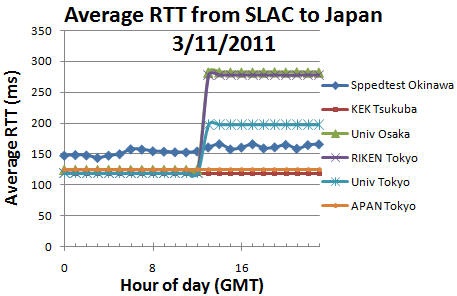...
The hosts monitored are seen in the table below.
IP name | Alias | City | Institution |
|
|---|---|---|---|---|
glbb.jp | JP.GLBB | Okinawa | Speedtest |
|
www.kek.jp | JP.KEK | Tsukuba |
| |
ns.osaka-u.ac.jp | JP.U-OSAKA | Osaka |
| |
ping.riken.jp | JP.RIKEN | Wako-Shi |
| |
www.u-tokyo.ac.jp | JP.U-Tokyo | Tokyo |
| |
ns.jp.apan.net | NET.APAN | Tokyo |
|
The map below shows the location of the hosts.
Immediate impacts of earthquake on Japanese hosts seen from SLAC
All of the 6 hosts that PingER monitors in Japan stayed up at the time of the earthquake.Looking from SLAC there were big increases in the average RTTs and minimum RTTs for some Japanese sites (but not all), see below. The [spreadsheet|^japan-earthquake.xlsx] gives more details.
Further pinpointing of causes for increased RTTs
RIKEN seen from the world
Looking at RIKEN (a monitoring mode and so easy to select on and also one of the most affected as seen from SLAC) seen from the world looking at avg RTT and min RTT we saw:
- No effect seen from Africa, E. Asia, Europe, L. America, M. East
- Big effect from N. America (Canada 163ms=>264ms, US 120ms=>280ms)
- India CDAC Mumbia no effect, Pune 380ms=> 460ms, VSNL Mumbia 360ms=>400ms
- Sri Lanka no effect
- Pakistan (we have lots of monitors so should be interesting).
- NIIT sees no effect (nb not on PERN)
- The PERN (Pakistan Education and Research Network) nodes starting with 111. (apart from UAAR see later, this needs more investigation) see 420ms=>500ms
- The PERN nodes starting with 121. See no effect
Conclusion It is not the site RIKEN that has gone bad, rather it is some of the routes
RIKEN Looking at Japan
Japanese hosts seen from JP.RIKEN.N3 (RIKEN) see no impact on RTT
It looks the problem is in the route to Japan not within Japan itself. I wonder if the undersea earthquake has disrupted some cables? This appears to be in line with the information from [http://www.renesys.com/blog/2011/03/japan-quake.shtml![]() |http://www.renesys.com/blog/2011/03/japan-quake.shtml] and [http://www.networkworld.com/news/2011/031411-quake-damage-to-japan-cables.html?source=NWWNLE_nlt_network_architecture_2011-03-15
|http://www.renesys.com/blog/2011/03/japan-quake.shtml] and [http://www.networkworld.com/news/2011/031411-quake-damage-to-japan-cables.html?source=NWWNLE_nlt_network_architecture_2011-03-15![]() |http://www.networkworld.com/news/2011/031411-quake-damage-to-japan-cables.html?source=NWWNLE_nlt_network_architecture_2011-03-15]. .
|http://www.networkworld.com/news/2011/031411-quake-damage-to-japan-cables.html?source=NWWNLE_nlt_network_architecture_2011-03-15]. .
Undersea Cables
A map of the cables from Telegeography is seen below:
The following quote from Telegeography on 4/11/2011 confirms our early suspicions that the initial impact was probably due to rerouting of traffic as some undersea route were affected.
The massive earthquake off the coast of Japan damaged several undersea cables, some of which are still awaiting repair. Despite these outages, communications between Japan and the rest of the world were largely unaffected, due to the large array of undersea cables linked to Japan. ‘The earthquake temporarily knocked out approximately 30% of Japan’s international capacity,’ according to TeleGeography Research Director Alan Mauldin. ‘The deployment of multiple new trans-Pacific cables and intra-Asian cables over the past three years proved instrumental in preventing this disaster from also disrupting communications.’
Longer term impacts
However, we were not monitoring a Japanese host near the epicenter.
...
Looking again on April 5th 2011, the RTTs from SLAC to the University of Osaka, RIKEN, University of Tokyo and KEK all increased with a step function from around 135ms to around 200ms around midday on the 24th March. Below is shown the RTTs for RIKEN as an example.
Routes
Comparing the routes from SLAC to RIKEN (ping.riken.jp) and from SLAC to NET.APAN.N2 (ns.jp.apan.net) on 3/11/2011, we see RIKEN has more hops and goes via the Avenue of the Americas in NY, while APAN goes directly via Sunnyvale near SLAC and then via Pacific Wave directly to Japan. The traceroutes from SLAC to the University of OSAKA and the University of TOKYO are similar to traceroute from SLAC to RIKEN.
However on 3/22/2011 the route to RIKEN went westwards across the Pacific and the RTT was very stable with Min/Avg/Max/Stdev 131.985/132.173/132.607/0.443 ms for 148 pings. The routes to the University of OSAKA and the University of TOKYO were similar.
Theroute from SLAC to RIKEN on April 6th (i.e. after the step change from 135ms to 200ms on March 24th) went from SLAC eastwards through Sunnyvale, Denver ,Kansas, Clevland, Boston to the Avenue of the Americas in New York and then to Japan. This trip eastward across the US added an extra 60-70ms to the RTT.



